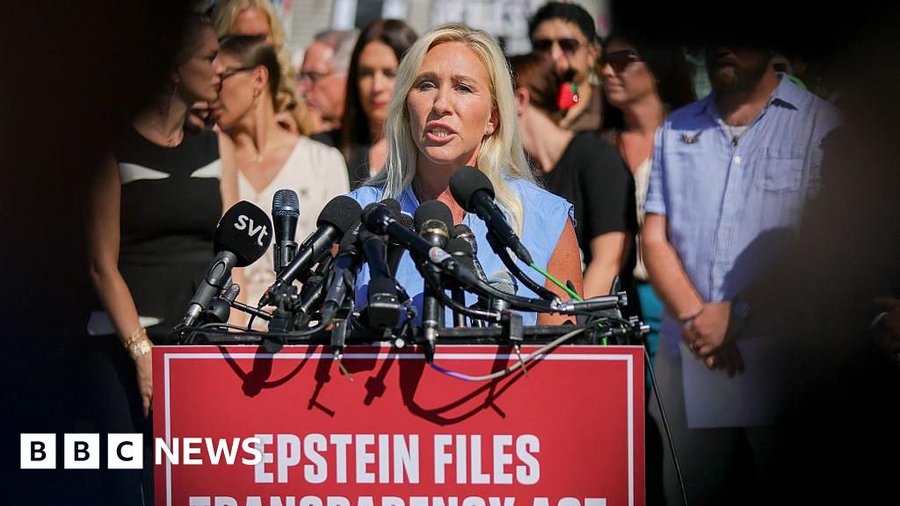

Marjorie Taylor Greene came into Congress as one of Donald Trump's staunchest defenders.
Sworn into office just days before the 6 January 2021 attack on the US Capitol, Greene supported the president - and echoed his contention that the 2020 presidential election was "stolen" - when many in the Republican Party disavowed him.
Now, five years later, Greene will leave Congress having been branded a "traitor" by the man she once revered.
Over the course of just a handful of months, Greene broke with Trump in the most dramatic fashion.
Although Greene had criticised Trump's decision to launch airstrikes on Iran, his support for Israel during the Gaza War and a lack of sufficient regulation of big technology companies earlier this year, the final fracture began over Jeffrey Epstein, the late financier and convicted paedophile who had connections to the wealthy and powerful.
She condemned Trump's unwillingness to order his justice department to fully release its files on the case, and appeared alongside Epstein's victims – and Democrats - to force a House vote on the matter.
It didn't end there, however.
Greene would also question Republican strategy during the recent government shutdown, siding with Democrats in calling on her party to address expiring healthcare subsidies for low-income Americans.
She publicly berated Trump for what she said was an undue emphasis on foreign policy at the expense of addressing economic and affordability concerns.
"The American people aren't motivated by foreign wars or bailouts for other countries," she wrote on X earlier this month. "They want leaders who show up, do the job, and fight for them every single day!"
Greene continued to insist that she supported Trump, but it became increasingly clear that she has a view of the "America First" movement that differs from the US president's.
An activist turned congresswoman who made her name railing against the political establishment had now found that the Maga – "Make America Great Again" - movement she supported had become the establishment.
And as the weight of Trump's power focused on her ouster – she broke for the exits with a few parting shots.
"I refuse to be a 'battered wife' hoping it all goes away and gets better," she said in her resignation statement.
"If I am cast aside by Maga Inc and replaced by Neocons, Big Pharma, Big Tech, Military Industrial War Complex, foreign leaders, and the elite donor class that can't even relate to real Americans, then many common Americans have been cast aside and replaced as well."
Throughout her career, she often embraced controversy and leaned into conflict.
A gym instructor in Georgia, she began engaging in politics in 2016, as Trump started his successful campaign for the White House. She made frequent trips to Washington DC, where she would berate Democratic members of Congress for what she said were their socialist and pro-Islam policies.
She promoted baseless QAnon conspiracy theories, questioning whether shootings in a US school were "staged" and alleging that the Democratic party was secretly run by a group of powerful paedophiles.
Once in Congress, she clashed with Democrats - and members of her own party. Although she renounced some of her past conspiratorial views, the House voted to remove her from her committee assignments shortly after she took office.
When Republicans returned to power in Congress she had a political rehabilitation of sorts, working with then Speaker of the House Kevin McCarthy to consolidate conservative support in the chamber. When McCarthy was ousted, Greene fought with his replacement, Mike Johnson, and launched an unsuccessful bid to remove him as well.
In 2023, she was expelled from the conservative House Freedom Caucus.
She had become a political wildcard – still despised by many on the left but also viewed with suspicion by conservatives. She still had close ties with Trump, which gave her influence in Washington.
And then she didn't.
In a brief interview on Friday night, Trump told ABC News that Greene's departure from Congress was "great news for the country".
He would later post on Truth Social that Greene "went bad" but that he would "always appreciate Marjorie and thank her for her service to our country".
Greene said she will return to her home in Georgia and a "new path ahead". Although she had reportedly expressed interest in the state's governor race next year, she recently said she would not seek that office – or seek to unseat incumbent Democratic Senator Jon Ossoff.
Her decision to resign effective 5 January, however, leaves open the possibility that she could change her mind and run for office in a state where Republican politicians, like the current Georgia governor Brian Kemp, have shown that it is possible to win elections even without Trump's support.
The move also allows Greene to reposition herself politically, as the Republican Party begins grappling with an environment where public support for Trump - particularly his handling of the economy - appears to be souring and the president, limited by the constitution, will never appear on a presidential ballot again.
At 51, Greene's tenure in Congress may be at an end, but her involvement in American political life may be far from over.














